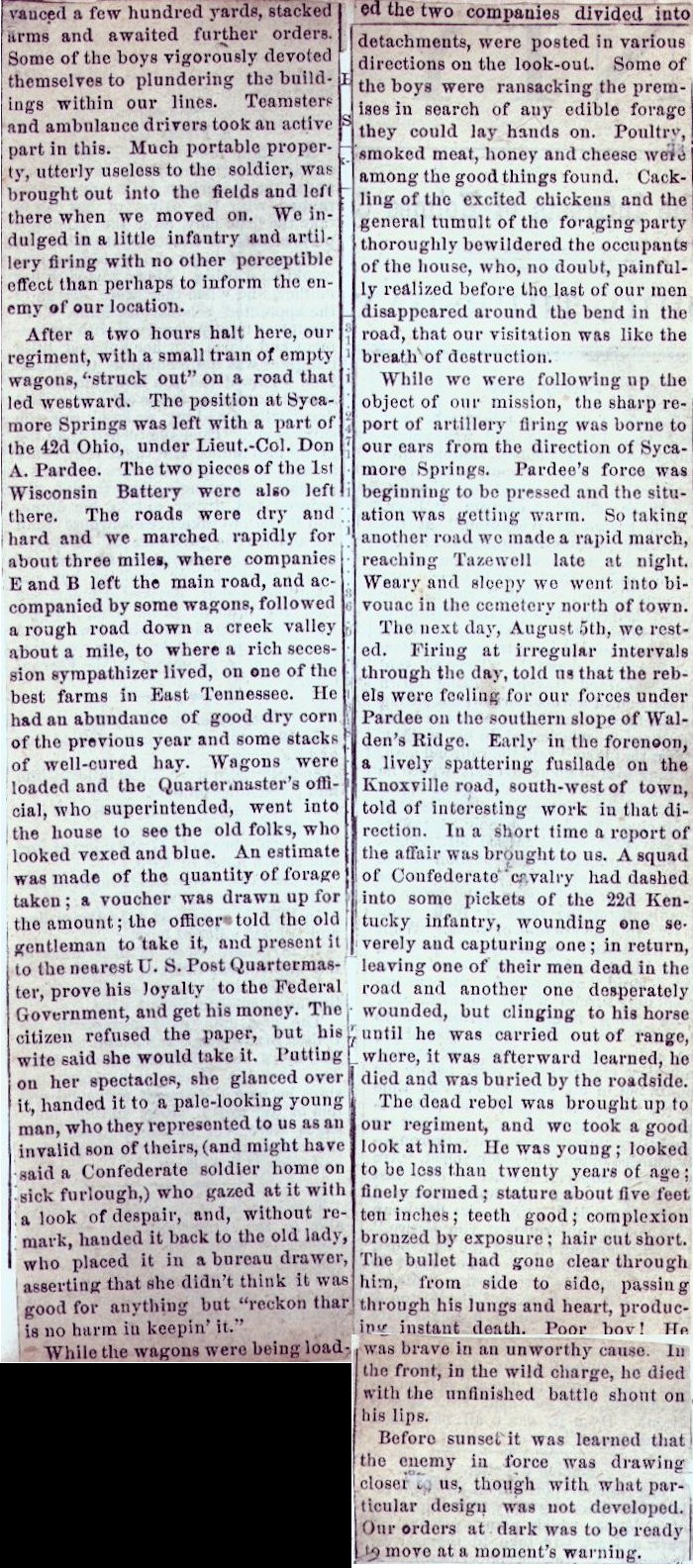| Camp & Field Page 24 | Camp & Field Index Page | 16th OVI Home Page | Camp & Field Page 26 |
The Camp & FieldArticles by Theodore Wolbach |
 Cpl. Theodore D. Wolbach |
The following image is taken from a book titled "Mortality and Statistics of the Census of 1850" in which it is believed retired Captain Rezin H. Vorhes, Company H, pasted over the pages a series of articles written by Cpl. Theodore D. Wolbach, Company E, titled "Camp and Field" and published, by chapter, in the Holmes County (Ohio) Republican newspaper from February 24, 1881 to August 17, 1882. The articles tell the story, in great detail and color, of the 16th OVI, from the inception of the 3-year regiment in October, 1861, through all its camps, battles and marches until it was disbanded on October 31, 1864. The articles pasted in the Vorhes book cover the first 35 chapters, published through October 20, 1881. All the remaining chapters were recently found in a Holmes County library by researcher Rob Garber who obtained copies, performed the transcriptions and provided to this website and which are also presented here, thus providing the complete work by Theodore Wolbach.
Throughout these articles click on the underlined white text for additional details.
The webauthor thanks 16th Ohio descendant Rob Garber for his excellent research on the Camp And Field articles and for performing the tedious digital transcription of those articles found on each page. The transcriptions were made to reflect the original articles verbatim, misspellings and all. Rob is the 3rd great nephew of Capt. William Buchanan, Company F, 16th Ohio, who served in the 90-day regiment as a private, re-enlisting in the three year regiment, and eventually making the rank of Captain of Company F. Thanks Rob!
Page 25 - Chapter 15 - August, 1862
 |
vanced a few hundred yards, stacked arms and awaited further orders. Some of the boys vigorously devoted themselves to plundering the buildings within our lines. Teamsters and ambulance drivers took an active part in this. Much portable property, utterly useless to the soldier, was brought out into the fields and left there when we moved on. We indulged in a little infantry and artillery firing with no other perceptible effect than perhaps to inform the enemy of our location. After a two hours halt here, our regiment, with a small train of empty wagons, |
ed the two companies divided into detachments, were posted in various directions on the look-out. Some of the boys were ransacking the premises in search of any edible forage they could lay hands on. Poultry, smoked meat, honey and cheese were among the good things found. Cackling of the excited chickens and the general tumult of the foraging party thoroughly bewildered the occupants of the house, who, no doubt, painfully realized before the last of our men disappeared around the bend in the road, that our visitation was like the breath of destruction. While we were following up the object of our mission, the sharp report of artillery firing was borne to our ears fro the direction of Sycamore Springs. Pardee's force was beginning to be pressed and the situation was getting warm. So taking another road we made a rapid march, reaching Tazewell late at night. Weary and sleepy we went into bivouac in the cemetery north of town. The next day, August 5th, we rested. Firing at irregular intervals through the day, told us that the rebels were feeling for our forces under Pardee on the southern slope of Walden's Ridge. Early in the forenoon, a lively spattering fusillade on the Knoxville road, south-west of town, told of interesting work in that direction. In a short time a report of the affair was brought to us. A squad of Confederate cavalry had dashed into some pickets of the 22d Kentucky infantry, wounding one severely and capturing one; in return, leaving one of their men dead in the road and another one desperately wounded, but clinging to his horse until he was carried out of range, where, it was afterward learned, he died and was buried by the roadside. The dead rebel was brought up to our regiment, and we took a good look at him. He was young; looked to be less than twenty years of age; finely formed; stature about five feet ten inches; teeth good; complexion bronzed by exposure; hair cut short. The bullet had gone clear through him, from side to side, passing through his lungs and heart, producing instant death. Poor boy! He was brave in an unworthy cause. In the front, in the wild charge, he died with the unfinished battle shout on his lips. Before sunset it was learned that the enemy in force was drawing closer to us, though with what particular design was not developed. Our orders at dark was to be ready to move at a moment's warning. |
| Camp & Field Page 24 | Camp & Field Index Page | 16th OVI Home Page | Camp & Field Page 26 |